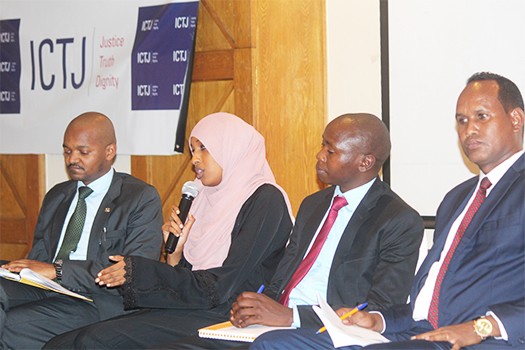Nairobi—Kenyan media house Africa Uncensored has teamed up with the International Center for Transitional Justice (ICTJ) on a documentary that explores the Bulla Karatasi massacre that took place in the northern region of Garissa, Kenya, and its impact on communities in the North. The partners launched the film on November 16 in Nairobi at a screening featuring presentations by human rights experts and the film’s lead journalist, Iqra Salah.
At a screening in Garissa earlier that week, victims expressed lingering pain from the human rights abuses they and their families suffered during the brutal and indiscriminate attack on Garissa residents by Kenyan security forces in November 1980. The extreme, targeted violence against ethnic Somali-Kenyan citizens resulted in a state of emergency and over 3,000 lost lives.
In its 2011 report, Kenya’s Truth, Justice, and Reconciliation Commission (TJRC) accused the security agents responsible for these events with torture, brutal beatings, burning of houses, rape, and sexual violence, among other atrocities. The TJRC findings also highlight that the massacres were a product of state-imposed collective punishment on communities whose members were suspected of crimes.
Thirty-eight years later, despite a public apology from President Uhuru Kenyatta in 2015, the perpetrators have yet to be identified or held accountable, and most Kenyans—including ethnic Somali—are still in the dark about the history of Bulla Karatasi. Moreover, while the Wagalla Massacre of 1984 has been fairly well documented, the 1980 attack has been a missing chapter in official and unofficial accounts of human rights abuses in this historically marginalized region.
“The refusal of the Ministry of Defense and other actors to cooperate with the TJRC and act on its findings have undermined Kenya’s truth and reconciliation process have left victims—who still hope for justice and collective reparations—living in a state of limbo for almost four decades,” said Chris Gitari, Head of ICTJ’s Kenya Office.
During the resurgence of violence following the 2007 presidential election, Kenyan security forces also targeted ethnic Somali communities, and little has been done to repair ongoing tensions in the North as a result of ethnic targeting and human rights abuses related to counterterrorism operations. The film explores the root causes of violence and its connection to the present-day economic, social, and political marginalization and exclusion of communities.
“The film will help guide discussion and facilitate the participation of civil society toward a holistic analysis of the TJRC’s report, in particular, the experiences of Somali-Kenyans and other communities in the North,” said Gitari.
“It is also hoped that the political leadership and the Building Bridges to Unity Advisory Task Force will use the current spirit of national dialogue to engage communities in the North, finally acknowledge the suffering they have experienced, and offer concrete measures of reparation and restoration to advance meaningful inclusion and national cohesion,” he said.
The documentary will advance ICTJ’s efforts to partner with civil society on community-state dialogue initiatives, engage stakeholders around political and constitutional reforms stemming from the TJRC’s recommendations, and achieve redress for the legacy of state violence in the region.
Follow the film at @AfUncensored / ForgottenMassacre.
PHOTO: Journalist Iqra Salah discusses the new documentary film at its screening in Nairobi on November 16. (ICTJ)
